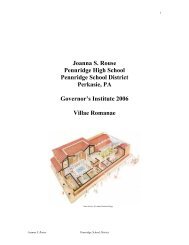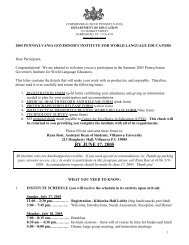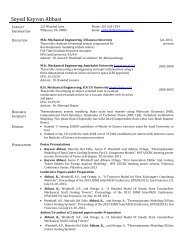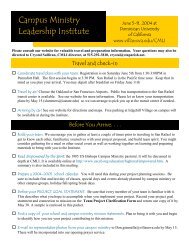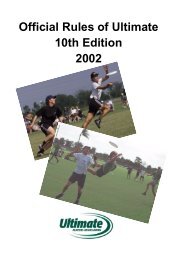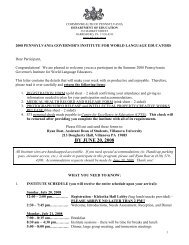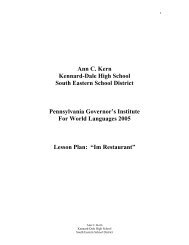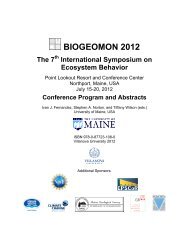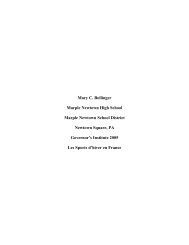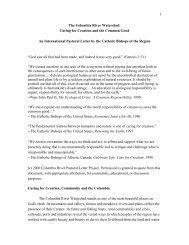Create successful ePaper yourself
Turn your PDF publications into a flip-book with our unique Google optimized e-Paper software.
Name: <strong>Judith</strong> <strong>Orman</strong>-<strong>Scalise</strong><br />
Hazleton Area School District<br />
Hazleton Area High School<br />
1601 W. 23 rd St.<br />
Hazleton, PA 18202<br />
(570) 459-3221<br />
Date: 16 August 2002<br />
Portfolio Entry Slip/Section Markers<br />
Institute: Governor’s Institute for World Language Educators<br />
Name of the Piece: Let Me Entertain You: Organizing Free Time Plans<br />
The Standard/s addressed: 1.1 Interpersonal Communication<br />
1.2 Interpretive Communication<br />
1.3 Presentational Communication<br />
2.1 Practices of Culture<br />
2.2 Products of Culture<br />
3.1 Making Connections<br />
4.1 Language Comparisons<br />
5.1 School and Community<br />
1<br />
<strong>Judith</strong> <strong>Orman</strong>-<strong>Scalise</strong><br />
Hazleton Area School District
Lesson Plan Template<br />
Topic: Let Me Entertain You: Organizing Free Time Plans<br />
Level: Level I German: four block/s of 86 minutes and homework assignment/s<br />
Standard/s: 1.2, 1.2, 1.3, 2.1, 2.2, 3.1, 4.1, 5.1<br />
Overview: When young visitors come from a German-speaking country, they want to know<br />
about the area they are visiting. This unit enables students to communicate in the target language<br />
to set up an itinerary for their German-speaking guests. Students will learn to organize and plan a<br />
day of activities. They will review formal and informal time expressions, identify and use<br />
vocabulary about places people typically visit in cities, and make plans for entertaining a guest in<br />
the city.<br />
Agenda/action plan/schedule:<br />
Lesson 1- 2: Students will review time, then be introduced to and practice new vocabulary<br />
about places in a typical city.<br />
Lesson 3: A. After students have become familiar with selected vocabulary, they will be<br />
divided into groups of three to plan activities for a German-speaking “guest.”<br />
Their goal is to prepare and present an enticing package, so that a guest will<br />
choose their tour.<br />
For the itinerary groups must<br />
a) list an appropriate time schedule for the day’s activities<br />
b) list at least five places they will take their guests, noting why places are<br />
highlighted<br />
c) make appropriate rejoinder comments, such as “great,” “wonderful”<br />
d) prepare a poster display to accompany auditory presentation<br />
B. One group of students will be the “guests.” They will choose from pictures of<br />
famous Germans, then prepare a short introduction of themselves as that<br />
person. This group will formulate questions and rubric for groups to determine<br />
which group has the most enticing tour. Rubrics should be distributed to groups<br />
as soon as criteria have been compiled.<br />
Lesson 4: Students present itinerary agendas for guests. Guests will be asked to circulate to<br />
different groups listening to presentations. In this way, presentations can be<br />
heard/said several times, before a final evaluation is made. If exchange students<br />
are available, they should become part of the “guest list.”<br />
Hook/Prior Knowledge: The lesson will begin with a review of formal (24-hour) and informal<br />
time expressions, using two short activities.<br />
1. What time is it? Students review numbers and time expressions<br />
A. Order in the Classroom. Each student gets a card upon which is written a sentence<br />
containing a time expression, either formal or informal. They line up in order by<br />
time of day, then read aloud the information on their cards. If class is large, cards<br />
2<br />
<strong>Judith</strong> <strong>Orman</strong>-<strong>Scalise</strong><br />
Hazleton Area School District
can be color coded, so two teams can play against each other.<br />
B. Beat the Clock. Two clocks with movable hands are placed on wall. Stack of<br />
cards containing time expressions is placed face-down. Two teams compete. One<br />
student says time expression as shown on card. Two students at clock, move hands<br />
to proper position. Student who completes activity first wins a point for the team.<br />
2. Where do you go in your free time? Students practice places to visit.<br />
Zoo<br />
Park<br />
Eisdiele<br />
Kino<br />
Konzert<br />
Theater<br />
Museum<br />
Schwimmbad<br />
Sportplatz<br />
Disco<br />
Oper<br />
Geschenkladen<br />
Haus(e)<br />
Restaurant<br />
Bibliothek<br />
Imbissstube<br />
Marktplatz<br />
Zirkus<br />
Automuseum<br />
Universität<br />
Naturpark<br />
Kunstmuseum<br />
Flughafen<br />
Laden<br />
Gaststätte<br />
Kirche<br />
Philharmonie<br />
Einkaufszentrum<br />
Schule<br />
Berg<br />
3<br />
<strong>Judith</strong> <strong>Orman</strong>-<strong>Scalise</strong><br />
Hazleton Area School District
A. Students receive vocabulary list above and review meanings of words with<br />
partner.<br />
They then see ads for selected places to visit in typical cities. These can be<br />
on overheads, as power point display, or as visuals. Students organize words<br />
accordingly.<br />
B. Students hear mini-stories describing places and organize words<br />
accordingly.<br />
C. Bingo game matching vocabulary with pictures can also be played. Students<br />
hear vocabulary in sentences and creative mini-stories in German.<br />
3. Let’s talk! Students<br />
A. Students are given two lines of a dialog. They then read aloud to find their<br />
dialog match. Dialog stories will follow dialog plan telling where, when,<br />
and suitable rejoinders.<br />
B. Numbered heads. Teacher may tell mini-story about selected places, then<br />
have a student in each group of four write identify location of mini-story.<br />
C. Based on ads from selected places German teens visit in their free time,<br />
dialog partners present simulated phone conversations, making plans based<br />
on times/activities listed.<br />
Engagement/learning experiences/progress indicators:<br />
1.1. Students will ask and answer questions to obtain information about an itinerary<br />
pertinent to teen interests.<br />
Students will exchange information to learn about places of interest.<br />
Students will express opinions about selected places of interest.<br />
1.2 Students comprehend main ideas in developmentally appropriate oral narratives<br />
such as mini-stories based on time expressions and places of interest.<br />
Students use knowledge acquired about their home country to comprehend spoken<br />
and written ideas in German.<br />
Students will identify German terms for selected places in a city.<br />
1.3 Students present short “sales” pitch to classmates to highlight places of interest.<br />
2.1 Students use appropriate verbal (du/Sie) and nonverbal behavior for presentations<br />
2.2 Students identify and speak appropriately with famous Germans.<br />
3.1 Students demonstrate an understanding of time, both in formal (24-hour) and<br />
informal expressions in German.<br />
4.1 Students identify and use cognates in conversation.<br />
5.1 Students communicate with native speakers about local places of interest.<br />
Materials:<br />
1. Text resource: “Verabredungen,” Ch. 11, Sowieso, 1995 Langenscheidt KG<br />
2. Ads showing places people visit, listing opening and closing times<br />
3. Index cards with time expressions<br />
4. Index cards with mini-dialogs<br />
5. Pictures of young, famous Germans (ex. Tom Tykwer, Oli Kahn, Heidi Klum)<br />
6. Worksheet based on Wechselspiel concept: Each partner must ask questions to fill in<br />
information missing on worksheet. Ex. Partner A has selected information needed by<br />
4<br />
<strong>Judith</strong> <strong>Orman</strong>-<strong>Scalise</strong><br />
Hazleton Area School District
Partner B. Each must ask questions to fill in missing information.<br />
Technology connections<br />
1. http://www.hschwab.com/sws/html This site contains practical exercises for grammar<br />
and vocabulary.<br />
2. http://www.germany-tourism.d/e/1575.html This German City experience displays a<br />
prominent selection of German cities to explore. Site contains an excellent map of<br />
Germany for students to reference selected cities in different Bundesländer, overview<br />
of “magic” cities with tourist attractions, and selected highlights and tour possibilities<br />
3. http://grow.aatg.org/vol_2-1/web_resources/resources_pages/verkehr.html This<br />
reference site enables students to continue work to learn about cities, customs, culture<br />
in German-speaking countries.<br />
4. http://www.officialcitysites.org/germany.php3.htm. Cities in Germany. The German<br />
Embassy and the German Information Center give a host of information concerning<br />
Germany.<br />
Integration/Extensions-<br />
A. Students can develop mini-quizzes for each other, based on the concept listed below:<br />
Jetzt kannst du sagen, in welcher Stadt der Zoo liegt, in dem die folgenden neuen Tiere<br />
zu sehen sind: jeweils ein Uhu, Gepard, Ren, Adler, eine Boa, Hyäne und Meerkatze.<br />
Kleiner Tipp: Bring die Anfangsbuchstaben der neuen Tiere in die richtige Reihenfolge.<br />
So findest du ganz leicht die Stadt,d ie wir meinen.<br />
Die Tiere findest du im Zoo von<br />
Hyäne – Adler – Meerkatze – Boa – Uhu – Ren – Gepard<br />
- HAMBURG -<br />
B. Based on story reading “Wo ist Susi,? Students can role-play situations which happen<br />
at a selected place. Students can also begin a unit of study about the zoo, identifying<br />
zoo animals, locating zoos in Germany, and planning an itinerary for a day at the zoo.<br />
Realia:<br />
+ Ads for current free time events in German-speaking countries.<br />
+ Pictures of famous Germans<br />
Supplemental:<br />
To extend the activity, students will then be “entertained” by their German-speaking<br />
guests. By doing research about selected cities in a German-speaking country, students<br />
can create a poster display to “sell” an entertainment package for young people wanting<br />
to travel to Europe.<br />
5<br />
<strong>Judith</strong> <strong>Orman</strong>-<strong>Scalise</strong><br />
Hazleton Area School District
6<br />
<strong>Judith</strong> <strong>Orman</strong>-<strong>Scalise</strong><br />
Hazleton Area School District



